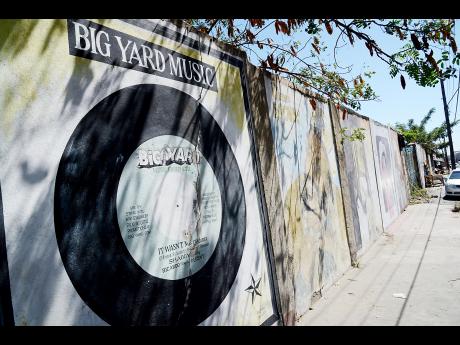The Music Diaries | Orange street - Mecca of Jamaican music
Growing up along Orange Street in downtown Kingston - the heart of Jamaica's popular music during its embryonic stage - I was privileged to be among some of the greats who created the foundation music of ska and rocksteady. Music Street and Beat Street, as Orange Street was then called, was a constant buzz of activity, with a multitude of record stores and recording establishments that acted like a magnet for dozens of aspiring artists whose dream was to become musical stars.
Some of the more prominent music establishments along the Beat Street corridor at the time, as I remember them, and which I name merely as a way of identifying them, included Bunny Lee's Agro Sounds, Phil Pratt's Sunshot establishment, Coxson's record store, Mr Robinson's Caribbean Distribution Company, Prince Buster's Record Shack, Niney the Observer's store, Lyndon Pottinger' pressing plant, and his wife Sonia Pottinger's Tip-Top record store, J.J. Johnson Records, Lee Perry' Upsetters, Clancy Eccles music shop, Rupie Edwards' store, and Leslie Kong's Beverley's Records.
Record producers
Understandably, the artistes' attraction to these establishments was triggered by their desire to find financiers to assist them in getting their songs recorded. These financiers later became known as record producers. They were an indispensable ingredient in the musical mixture that created Jamaican's foundation music of ska and rocksteady. With the great risk factor involved, (concerning the success or failure of a recording), the producers, understandably, had a deep interest in who was selected and in the arrangement of the recordings. It was a rough game for those aspiring artistes who could not meet the standards set by producers, and many were left by the wayside. Jimmy Cliff's 1971 blockbuster movie, The Harder They Come, showcased a vivid episode of the difficulties encountered by aspiring artistes on their journey to a Jamaican recording studio.
In the real-life situation, Cliff was first sponsored and produced by the Chinese-Jamaican Leslie Kong - a restaurateur who operated a business at 135A Orange Street. Cliff's first recording for the producer - Hurricane Hattie in 1962 - brought both gentlemen into their respective professions. The recording, however, was Cliff's second choice as his first - Dearest Beverley - was turned down by audition man Derrick Morgan.
Almost facing Beverley's restaurant, was singer-producer Rupie Edward establishment. He has the distinction of producing Gregory Isaacs' first hit, My Only Lover, in 1971, which was perhaps the template on which succeeding lovers' rock recordings were built. Edwards' Success and Opportunity labels also released recordings for Joe Higgs, Bob Andy, Dobby Dobson, Max Romeo, and Johnnie Clarke.
Below North Street, on the western corridor of Beat Street, producer J.J. Johnson was producing hits for the Kingstonians like Winey Winey. Carl Dawking had Baby I Love You, and The Rulers had Coapasetic, while Prince Buster had under his wings the very prolific Eric Monty Morris with the massive hits Money Can't Buy Life and Humpty Dumpty. Studio 1 Boss Clement Dodd, operated his record store at the Charles Street intersection, while producers Clancy Eccles and Lee 'Scratch' Perry shared an outlet that was close by. Perry gained musical mileage for The Wailers at the time (late 1960s) with Duppy Conqueror and Small Axe.
Producer Bunny Lee, operating just below Beeston Street, kept the Beat Street musical legacy alive with a prodigious output of songs that, perhaps, could be matched only by Clement Dodd's Studio 1. Better Must Come and Cool Operator by Delroy Wilson, Stick By Me by John Holt, How Long by Pat Kelly, Everybody Needs Love by Slim Smith, and Roland Alphonso's One Thousand Tons Of Megaton, just to name a few, were massive hits for Lee. Just a stone's throw away, Niney the Observer was working wonders with Dennis Brown's Cassandra, West Bound Train, Here I Come, My Time, and Tribulation. Other stars on his roster included Delroy Wilson, Johnnie Clarke, Slim Smith, Jacob Miller, Freddie McGregor, Max Romeo, Ken Boothe, Junior Byles, Gregory Isaacs, I-Roy, and Horace Andy.
On the opposite side of the corridor, Caribbean Distribution Company, with Mr Robinson at the helm, produced Roy Panton and Millie Small's We'll Meet, which ranked in the top five during the ska-independence explosion of 1962, while Phil Pratt's Sunshot label made good work of John Holt's My Heart Is Gone and Strange Things. Pratt's catalogue swelled further with Dennis Brown's Black Magic Woman and Pat Kelly's Soulful Love.
Female producer
At the lower extremity of Beat Street, the only female producer in the business - Sonia Pottinger seemed to have got the cream of the crop with Marcia Griffiths, Ken Boothe, Delroy Wilson, Errol Dunkley, Stranger and Patsy, The Gaylads, The Melodians, and others coming into her fold.
But with all the dominance that music played in the Beat Street story, there was much more that helped to make the corridor one of the busiest and most exciting in Jamaica's capital city during the 1960s and '70s. The area was a virtual melting pot of music, social interaction, commercial activity, and residential home settings. Interspersed among the various record establishments and residences were Chinese Shops, small groceries, jewellery stores, milliners (female hat shops), cobblers, bars, hardwares, a drugstore, a garage, and a photo studio. Interestingly, I can't recall a church being on Orange Street.


